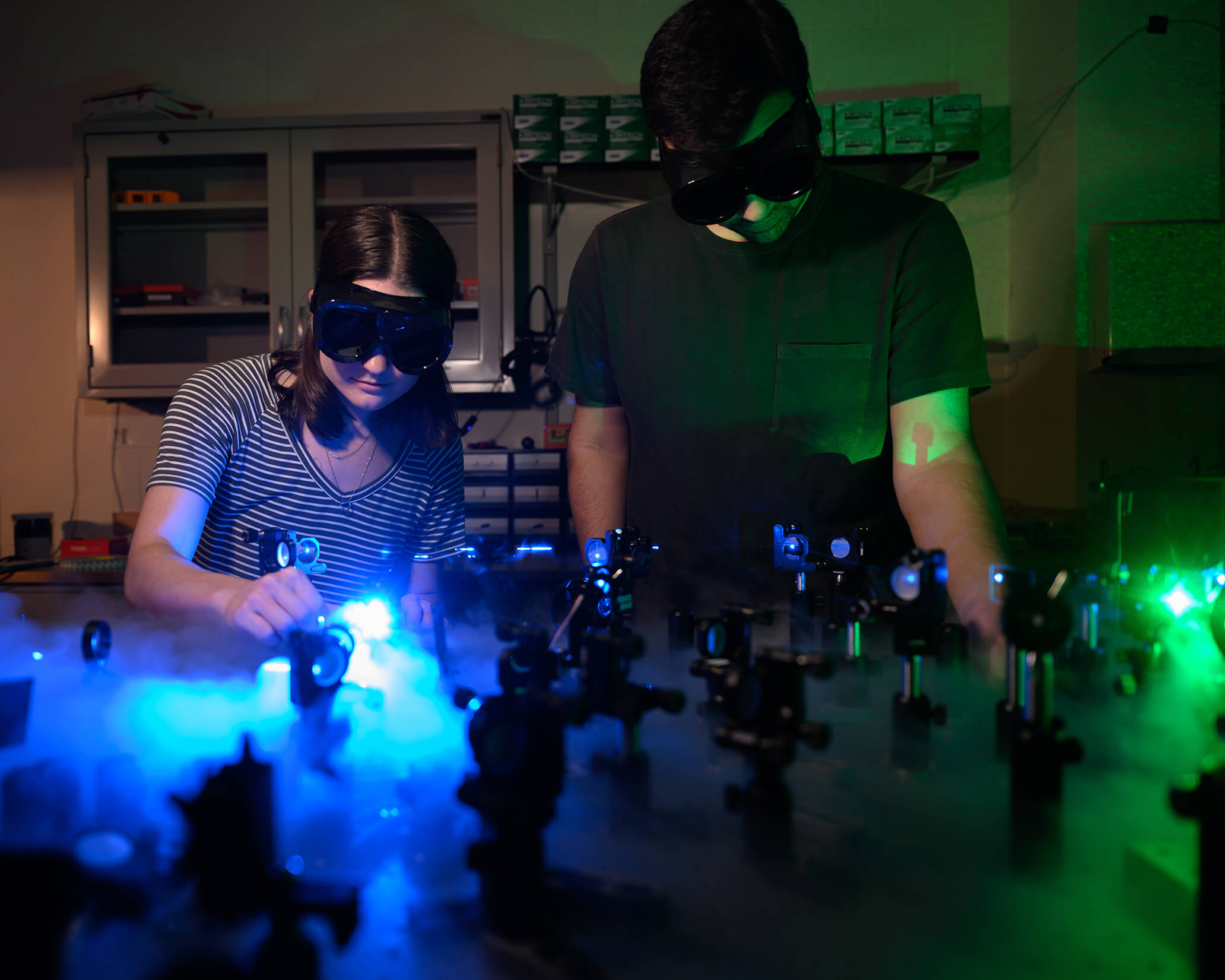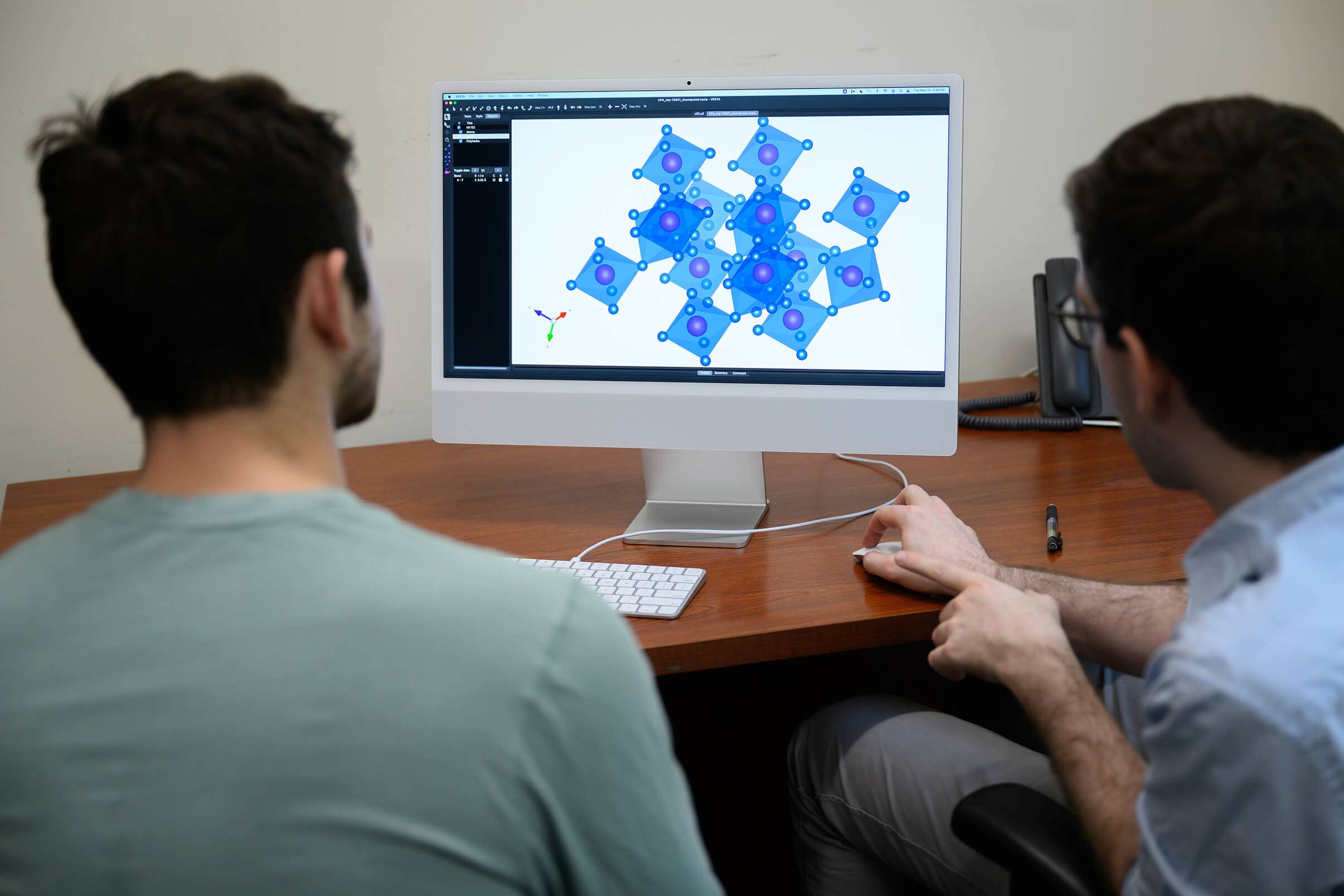Interested in research opportunities as part of your undergraduate experience but don’t know where to start?
The Wake Forest Physics Department is devoted to supporting physics as a participatory endeavor and encourages students to engage in research at all levels (undergraduate, graduate, and beyond). It is an important component to science education providing a first-hand experience of the scientific method.
For undergraduates, this can take the form of URECA (Undergraduate REsearch and Creative Activities) summer programs, course credit (PHY 381), and in (some cases) a stipend.
Students interested in summer research opportunities are encouraged to engage with potential faculty members by early January to meet the typical February deadlines of URECA funding applications.
How to choose a research group:
- Decide whether you prefer theoretical, computational or experimental physics
- Pick a subject area that interests you (biophysics, condensed matter physics, astrophysics)
- Talk to several faculty to help decide what fits you best
- It is possible to work with several groups during your tenure at WFU; stick with one group for at least one year
RESEARCH AREAS
What interests you?

Experimental Physics
Does the thought of probing materials with ultrafast powerful lasers get you excited? The thought of DNA mutations make your mind race? Maybe you would like to build a quantum computer or create transistors. Study blood with therapeutic applications to improve human health. Perhaps use an Atomic Force Microscope to learn mechanical properties of blood clots.
If you like to get your hands dirty, there are many exciting opportunities for undergraduates to be involved in the experimental process in Biophysics, Condensed Matter, Materials, Nanotechnology, Engineering, or Medical Physics.
Faculty involved in Experimental Physics

Theoretical and Computational Physics
Do you love pushing the limits of a computer? Would the thought of running code on a supercomputer excite you? Are you the person everyone asks for advice or help when it comes to computers and technology? If you answered yes to any of those questions, then you would enjoy the world of theoretical and computational physics.
Many research groups use the WFU DEAC supercomputing cluster or other high powered machines to model physical systems with the aim of studying advanced materials, complex astronomical questions or biological molecules. Push the development of solid state batteries, probe gravitational waves and black holes, contribute to cancer drug discovery, uncover quantum magnets, or even find materials capable of storing hydrogen. Expanding our knowledge of the natural world takes deep thought and careful mathematical analysis. Find rewarding work and discovery in theoretical physics.
Faculty involved in Theoretical and Computational Physics
Summer Research Opportunities
Wake Forest Research Fellowships
The Wake Forest Research Fellowship Program is sponsored by the Dean of the College of Arts and Sciences and is designed to encourage individual Wake Forest undergraduates to join their professors as junior partners on scholarly research projects. While improving opportunities for mentoring and helping students to progress into advanced work, these are also a means of supporting successful and dedicated students with financial scholarships. The application deadline is usually in early February for the following summer.
REU opportunities
The National Science Foundation supports undergraduate participation in research through the Research Experiences for Undergraduates (REU) program. For information on how to apply for an NSF REU see http://astrobites.com/2013/01/05/so-you-want-to-apply-for-an-reu-heres-how/. Deadline s depend on the site.
Amgen Scholars
An undergraduate summer research program in science and biotechnology. Please visit the site for more information.
The application deadline is early to mid February, depending on the site.
Science Undergraduate Laboratory Internships
SULI (Science Undergraduate Laboratory Internships) is a DOE program where undergraduate science and engineering majors can undertake research in a paid internship at a DOE National Lab. Depending on the national laboratory, these internships may be during the summer or academic year.
National Institute of Standards and Technology
The National Institute of Standards and Technology (NIST) offers a Summer Undergraduate Research Fellowship (SURF). SURF students work for 11 weeks, contributing to an ongoing research project under the guidance of a NIST scientist or engineer from one of the Institute’s nine major laboratories (Physics, Manufacturing Engineering, Building and Fire Research, Chemical Sciences, Electronics and Electrical Engineering, Information Technology, Materials Science, Neutron Research, and Nanoscale Science.
SPS Internships for Undergraduates
SPS internships are broad-based learning opportunities for undergraduate physics majors. Students are placed in organizations and agencies that utilize the energy and diversity of aspiring students and contribute to their professional development through meaningful assignments, both relevant to the institution’s programs and in the advancement of physics or allied sciences. Participating organizations also assign one or more mentors from its senior staff to guide the interns’ work and overall experience.
Summer Internship in Germany (DAAD)
The German Academic Exchange Service (DAAD) – in cooperation with science organizations in North America and Germany – is pleased to invite undergraduate students from the US, Canada and the UK in the fields of biology, chemistry, physics, earth sciences and engineering to apply for a summer research internship in Germany. RISE summer placements take place with research groups at universities and top research institutions across Germany. The RISE interns are matched with a doctoral student whom they assist and who will also serve as their mentor.
RWTH Aachen University, Germany
Another overseas research program that encourages American student applicants is the Undergraduate Research Opportunities Program (UROP) at Aachen University. Most of your time in the Aachen program will be spent on science research, but for the first two weeks participants work on an intensive German language course. The program also provides organized outings for its participants. A link to the RWTH Aachen University program can be found here: https://www.rwth-aachen.de/cms/root/Forschung/Forschen-an-der-RWTH/Angebote-fuer-Studierende/UROP/~wmy/UROP-INternational/lidx/1/
Nakatani RIES Fellowship in Japan for Science & Engineering Undergraduate Students
Nakatani RIES: Research & International Experience Program connects undergraduates with the best of science & engineering research in Japan and is open to freshman and sophomore science & engineering students attending U.S. universities. The program serves as a catalyst for U.S. students who are interested in future graduate study and research and contributes to the development of a generation of globally-engaged scientists & engineers who have the technical and culture skills to contribute to vibrant international research collaborations in the future.
